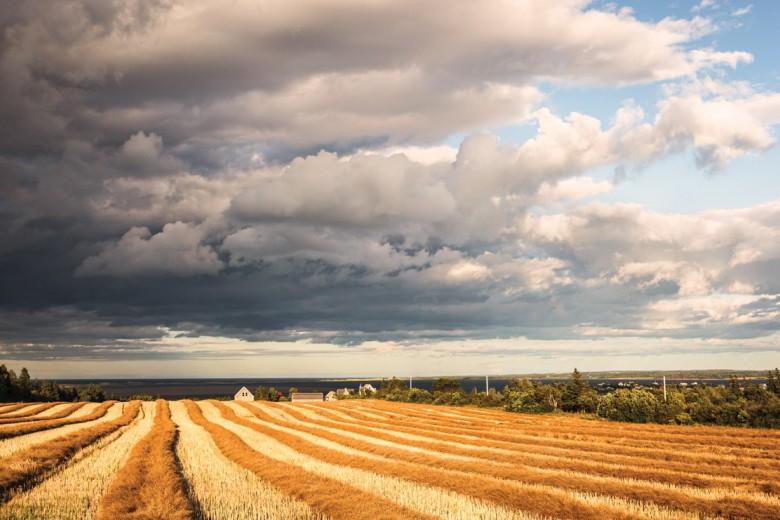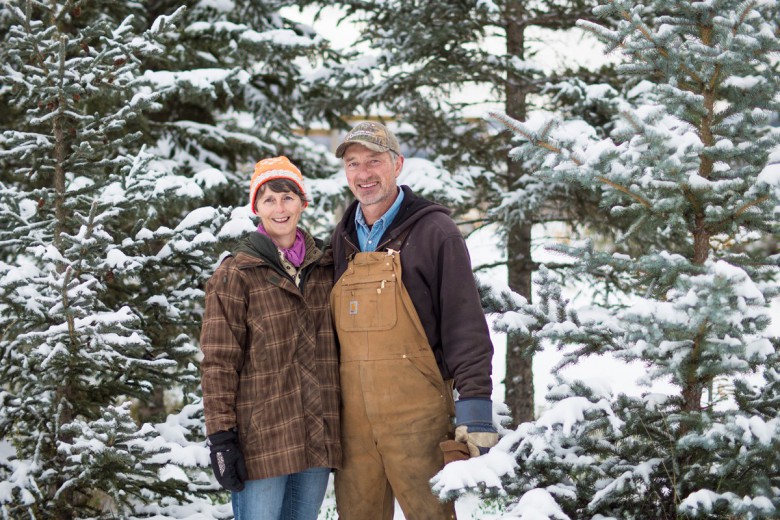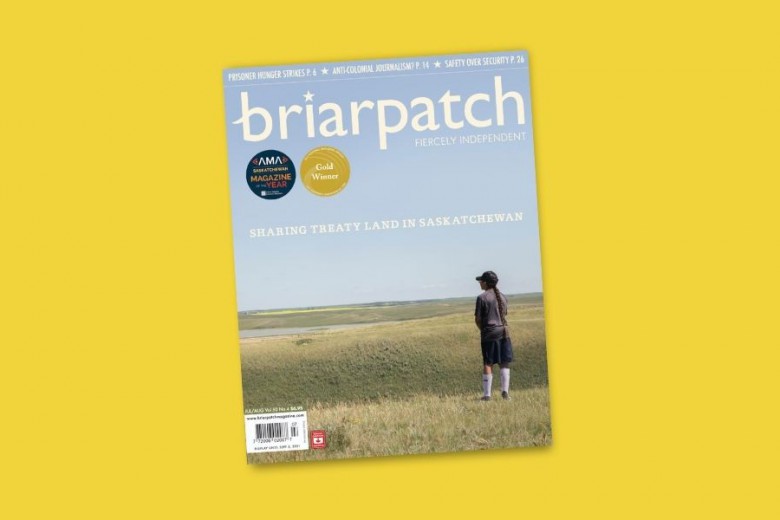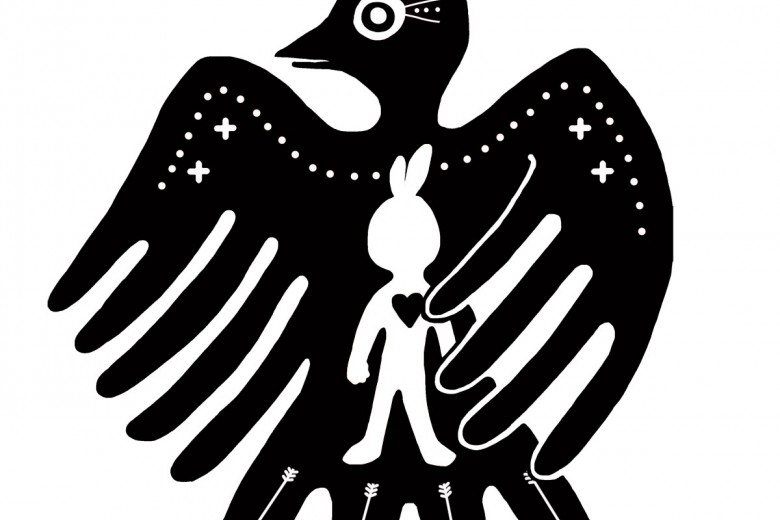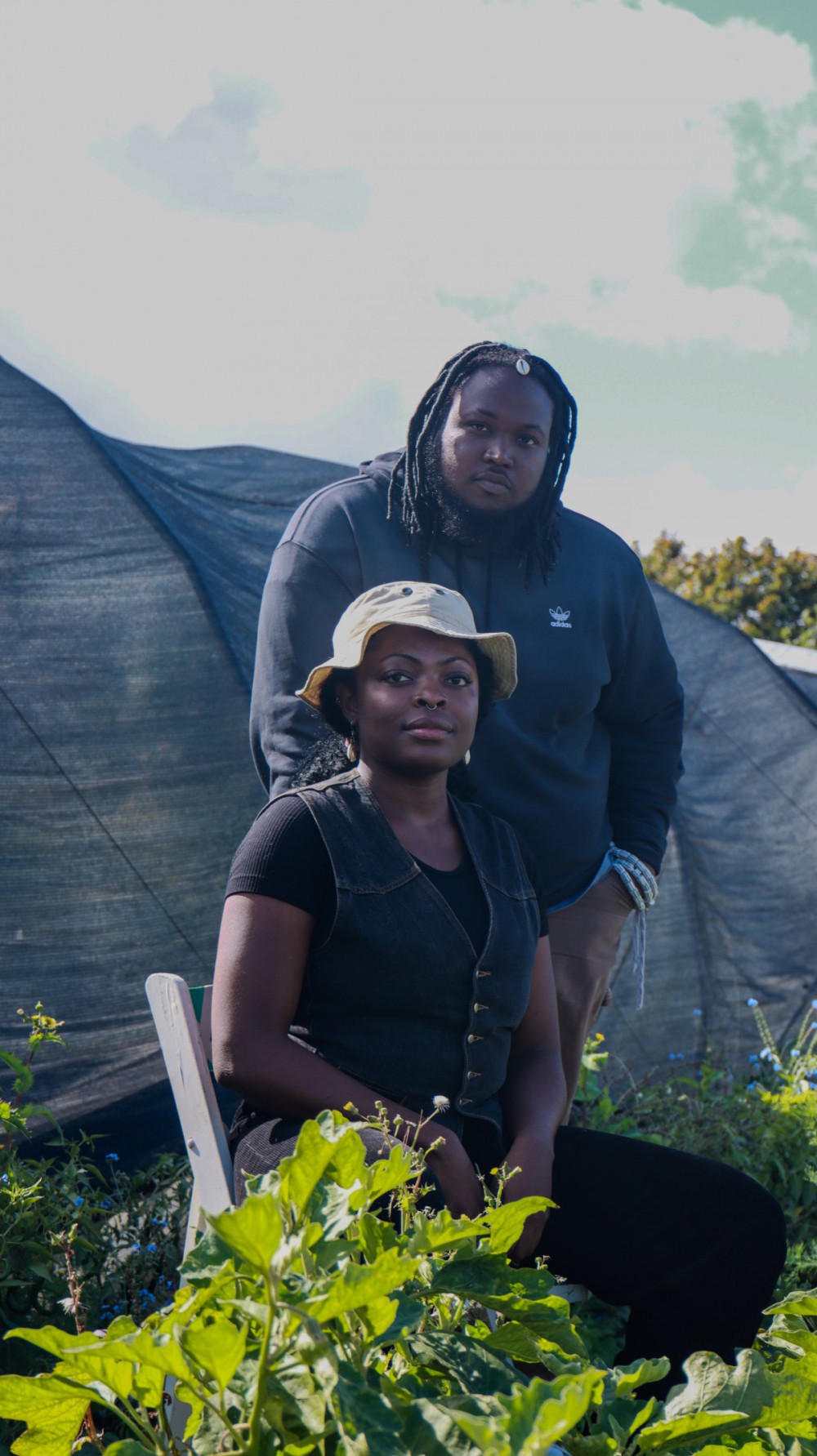
Siki Soberetonari (sitting) and Hansel Igbavboa (standing) at Ezinne Farms. Photo by Tamunoibifiri Fombo.
Early in the morning in Port Harcourt and Bonny Island, Nigeria, fishers eagerly check the nets they cast the night before, hoping to find a successful catch.
My family and I would sometimes start our days by going to the fishing ports to buy the catch of the day. We often bought seafood like isam, also known as periwinkle, and ngolo, also known as marine snails, to make dishes like fresh fish pepper soup and fisherman soup, which are common in the Niger Delta region. I always wanted fresh crab.
To accompany the seafood, we would pluck fresh vegetables from my grandma’s lush garden. My family also had a sugar cane farm on Bonny Island and we would eat the sugar cane juice from the sticks; it was a good time.
I moved to Toronto in 2018, and although there’s a large Nigerian population in the city, I have a hard time accessing culturally appropriate food. I’m from the Ijaw tribe, the fourth largest tribe in Nigeria, and we are mainly riverine people. Before moving to Canada, I was used to eating isam, rivers native soup, and boli (a plantain snack) almost daily, but once I migrated, these foods were more difficult to access.
Despite Black workers growing and cultivating much of Canada’s food, many Black people can’t access affordable, culturally appropriate food, and nearly a fifth are food insecure – a rate 2.8 times higher than white people. In Toronto, which is home to more than a third of Canada’s Black population, 28.4 per cent of Black households are food insecure and 36.6 per cent of Black children live in food-insecure households.
I spoke to farmer Siki Soberetonari, food justice advocate and researcher Hansel Igbavboa, and chef Rachel Adjei about growing and eating food that tastes like home, addressing food insecurity in Black communities, what it means to cultivate food on stolen Indigenous lands, and why food sovereignty is necessary for Black liberation.
“Growing food I can relate to”
Siki Soberetonari knew no one when she migrated as a teenager from Port Harcourt, Nigeria, to Toronto almost 10 years ago. She found nature and being outside grounding, and farming became a way for her to connect with the land. “When I moved to Canada years ago, land and nature became like a parent to me,” Soberetonari shares.
In 2023, she completed her first growing season as part of the Sundance Black Business and Farm Incubator Program run by Sundance Harvest, a Black-owned and -run farm located in Downsview Park in Toronto. The program subsidizes farming and training costs for new Black farmers and gives them access to mentorship and land to kick-start and grow their own farm businesses.
Soberetonari prefers “growing food I can relate to” so she chose to plant some of her favourite foods, which also remind her of home. “I like to eat eggplants, sweet and hot peppers, and tea. I grew herbs, and I like flowers so I grew them.”
“Being adopted by these lands and feeling the connection to nature has made me relate more to what colonization has done to my country, family, and people.”
“In Nigeria, we eat garden eggs, which are [a type of] eggplants here. When I started eating eggplant here, it wasn’t the same, but it was a connection, it was something for me and I think finding similarities and foods that even though they are not the same feel familiar and feel like home even in Canada.”
Siki Soberetonari harvests eggplants at her farm Ezinne Farms in downtown Toronto. Photo by Tamunoibifiri Fombo.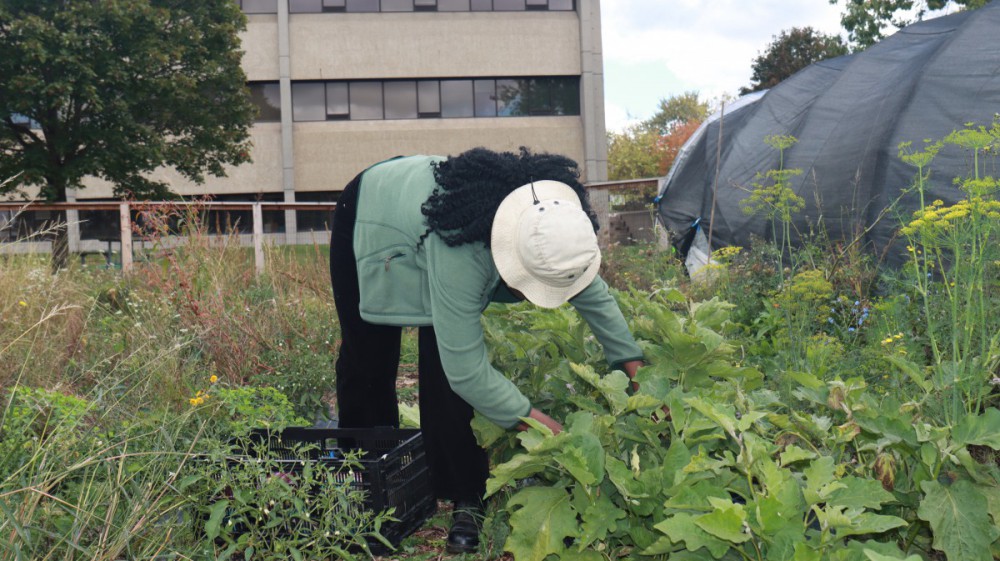
At her plot on the Sundance Harvest farm, Soberetonari shares her complicated feelings about growing food on stolen land. “Being adopted by these lands and feeling the connection to nature has made me relate more to what colonization has done to my country, family, and people.”
While farming on stolen Dish With One Spoon territory, she’s reflecting on the parallels between colonialism in Canada and the aftermath of colonialism in Nigeria, alongside the reasons for her migration to Toronto. “Connecting to land in Canada has become very personal because I have had to think about my own heritage and relationship to land,” Soberetonari explains. The difference is that in Canada, “colonization is still happening, and the so-called settlers never left.”
“As someone who is part of the Canadian state, I think of how I can make sure I am an ally and in relation to Indigenous people."
Nigeria was colonized by the Portuguese enslavement trade in 15th century, which the British took over in the mid-19th century. After years of protest, Nigeria won independence in 1960. However, “the consequences of land degradation and colonization still affect [Nigeria] today,” Soberetonari explains.
For example, in the early 20th century, the British oversaw oil exploration and the beginning of decades of devastating oil extraction in the Niger Delta region. Shell alone has caused immeasurable damage to the lands, waters, and health of the people; in the last 12 years, the company has produced 55 oil spills. The environmental consequences have made it difficult for farmers and fishers to remain in their trades and to support themselves and their families, and 13,000 people from the region are suing Shell for the deadly consequences of oil extraction and the toll on their communities and livelihoods.
Evicting the resource extraction industry and dismantling settler colonialism in so-called Canada is essential for Black communities here to achieve food security and sovereignty, according to Soberetonari. “As someone who is part of the Canadian state, I think of how I can make sure I am an ally and in relation to Indigenous people,” she shares.
Food security requires sovereignty
“Settler colonialism, white supremacy, and capitalism have created an oppressive system for Black Canadians in achieving food sovereignty,” write Hansel Igbavboa and Sheldomar Elliot in their report Future Farmers: The Challenge of Food Sovereignty for Black Farmers in the Greater Toronto Area.
Igbavboa and Elliot interviewed Black farmers in the Greater Toronto Area (GTA) on the barriers they face, the scope of food insecurity in the city, and potential solutions. The researchers found a lack of land ownership and access to land, the exploitation of Black workers in the food production industry, and the inaccessibility of culturally appropriate vegetables to be key barriers to Black food sovereignty and security. None of Canada’s large-scale, industrial farms are owned by Black people, and newer Black-owned urban farms are much smaller than average. For example, the Black Creek Community Farm, a Black-owned farm in Toronto, is 3.2 hectares, whereas the average farm size in Ontario is 249 hectares.
Igbavboa and Elliot also found that Black workers hold very laborious and precarious jobs in the sector. Many Black migrants come to Canada through the Seasonal Agricultural Worker Program, which was created in 1966 to bring Jamaican workers to Canada to make up for a shortage of apple pickers. Anan Lololi, founder of the Afri-Can FoodBasket, and Leticia Deawuo, the former director of Black Creek Farm, also shared with them that the intergenerational trauma of enslavement has made many Black people hesitant to enter the food production industry. Igbavboa and Elliot describe these barriers as “perpetuating a system where Black Canadians do not have access or opportunity to own the means of production of their food systems.”
“Settler colonialism, white supremacy, and capitalism have created an oppressive system for Black Canadians in achieving food sovereignty.”
To take back control of food production, Igbavboa organizes with the Black Youth Farming Collective, a Black youth–led project in Brampton, Ontario. “We are doing work that reconnects Black youth to land. We’re doing healing work that many of us don’t get the opportunity to do.”
“One of the major things we have done since summer of 2021 is hiring and paying Black youth to work on the McVean farm in Brampton. It’s not just about them growing but it is a holistic approach to learning.”
For most of the youth in the program, this is their first time growing food. “They come in having disjointed relations to land and nature. Some people say, ‘I don’t do bugs, I’m not going to take my shoes off, my feet can’t touch the ground,’” Igbavboa laughs.
Others tell him, “Oh, this is slavery.” Igbavboa explains this is “the post-traumatic notion a lot of Black people have that returning back to land is like returning back to slavery.” But over the course of the program, youth change their minds. “They’re happy to be there. They now say, ‘I will definitely do this again if I get hired again on this farm. I’m not still a fan of bugs, but I can be in an environment like this again.’ They’re proud that they toiled [on the] land and grew something. They’re so proud of their connection now to nature. And they want to do this again, they want to do more of this,” he proudly shares.
Creating a Black food ecosystem
Like Igbavboa, Ghanaian-Canadian chef Rachel Adjei also dreams of a Black food ecosystem. During the first year of the COVID-19 pandemic, Adjei was looking for a way to use her culinary expertise to support the Afri-Can FoodBasket – emergency food boxes filled with culturally appropriate foods for low-income and undocumented African, Caribbean, and Black people in Toronto.
In November 2020, she launched the Abibiman Project to fundraise for the food baskets. Abibiman roughly translates to “the land where Black people originate,” or another way to say “Africa” in the Twi language from Ghana.
“I started selling peanut soup, curries, a few spice blends, pastries, and African ingredients. The idea was to raise money and donate all the profits to Afri-Can FoodBasket so they could continue doing their work,” Adjei explains.
Chef Rachel Adjei prepares food for the Abibiman project. Photo courtesy of Rachel Adjei and taken by Jenna Marie Wakani.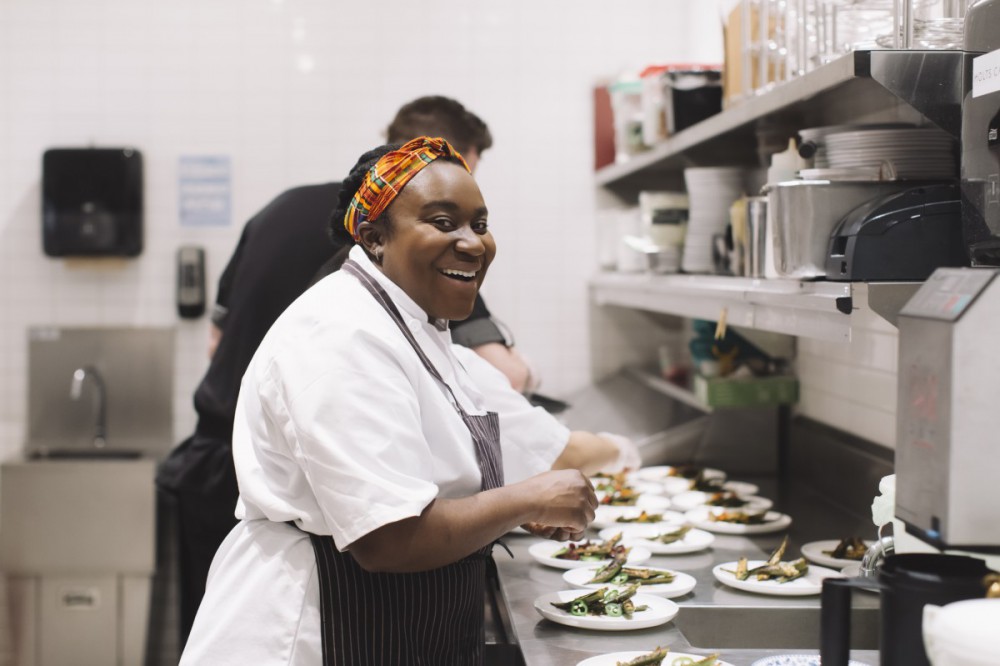
Even though Adjei cooks out of Toronto, which is home to the largest concentration of Black people in Canada, sourcing some of the ingredients she needs is difficult. She procures ingredients from local food suppliers and imports harder-to-find ones from Ghana, Senegal, and India. Generally, she tries to “stick within the umbrella of what I can access” and when Adjei can’t source the right ingredients, she tries to find an appropriate substitution. But if there isn’t one, she drops the recipe because she doesn’t want to “take away from what [the dish is] intended to be.”
“They’re starting to grow things like garden egg, certain types of greens, and I can also get okra locally. So there’s definitely an increase, which is very, very exciting. But there could also be more for sure,” Adjei says.
She is hoping to make sourcing for the Abibiman Project easier by working directly with local Black farmers. “I would love to see a more stable Black food ecosystem,” she shares. “I want to see Black farmers sourcing directly to Black chefs so there [are] less ingredients or less produce that we are importing and that even if we need to import, the importers in this chain making sure that the farmers, producers and distributors back home are being paid well.”
Food sovereignty, “the ability to exercise collective self-determination over food systems,” is necessary for Black communities to achieve food security.
Soberetonari plans on being one of those farmers. While completing the Sundance Harvest incubator program, she started her own farm business called Ezinne (ay-zeen-nay) Farms. “Ezinne means ‘good mother’ in Igbo language and it’s a name my grandma called me before she passed.”
She’s hoping Ezinne Farms can help ensure “community members are fed and food is affordable. […] We’re able to get healthy food into the hands of everybody and people who need it.”
To address the overwhelming food insecurity in Black households in Toronto, Black food security advocates, including the Afri-Can FoodBasket, partnered with the city’s Confronting Anti-Black Racism Unit to develop the Toronto Black Food Sovereignty Plan in 2021, which outlines critical steps for the city to take if it’s serious about addressing Black food insecurity. Igbavboa and Elliot believe that food sovereignty, “the ability to exercise collective self-determination over food systems, or the right to healthy and culturally appropriate food,” is necessary for Black communities to achieve food security.
Black communities have previously controlled their food systems on these lands and Black communities will once again be food sovereign in so-called Canada.
Soberetonari often thinks about her role in realizing Black food sovereignty as a farmer in Toronto. “I’m still learning what food sovereignty means in terms of people being able to be in control of food systems that affect them, have a circular economy, and make sure that businesses and organizations give back to the community.”
For Igbavboa, learning the history of Black settlements in Canada has been a helpful guide in working toward Black sovereignty. “I think our ancestors lived in the future that we imagine,” he shares. “There was a lot of Black settlements across even Ontario, places like [the] Queen’s Bush [settlement],” he explains.
Community members in the Queen’s Bush settlement and other Black settlements “had to work the lands with their hands” to sustain themselves, Igbavboa says. Black communities have previously controlled their food systems on the same lands he’s farming, and he knows that Black communities will once again be food sovereign in so-called Canada. This future, Igbavboa imagines, will prioritize “food for the people, respect for the growers and the peasant farmers, respect for the environment.”


